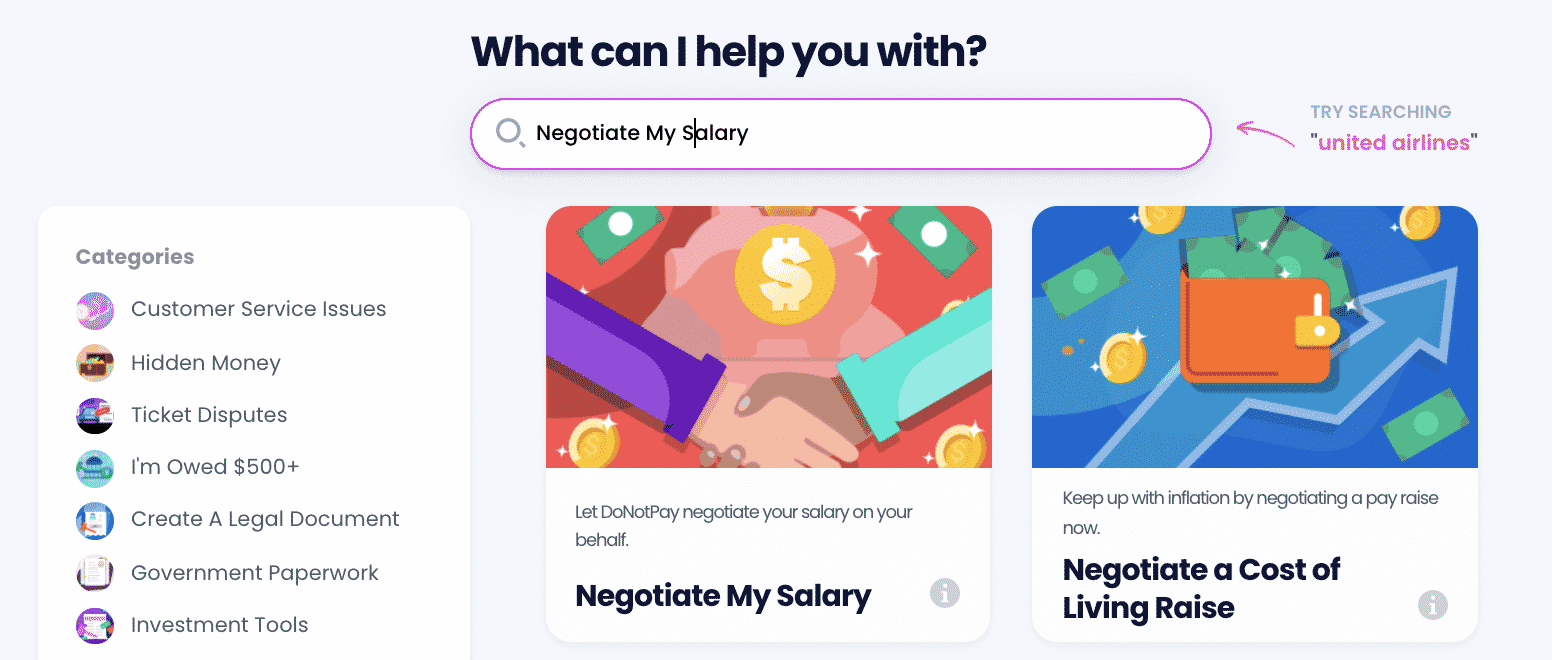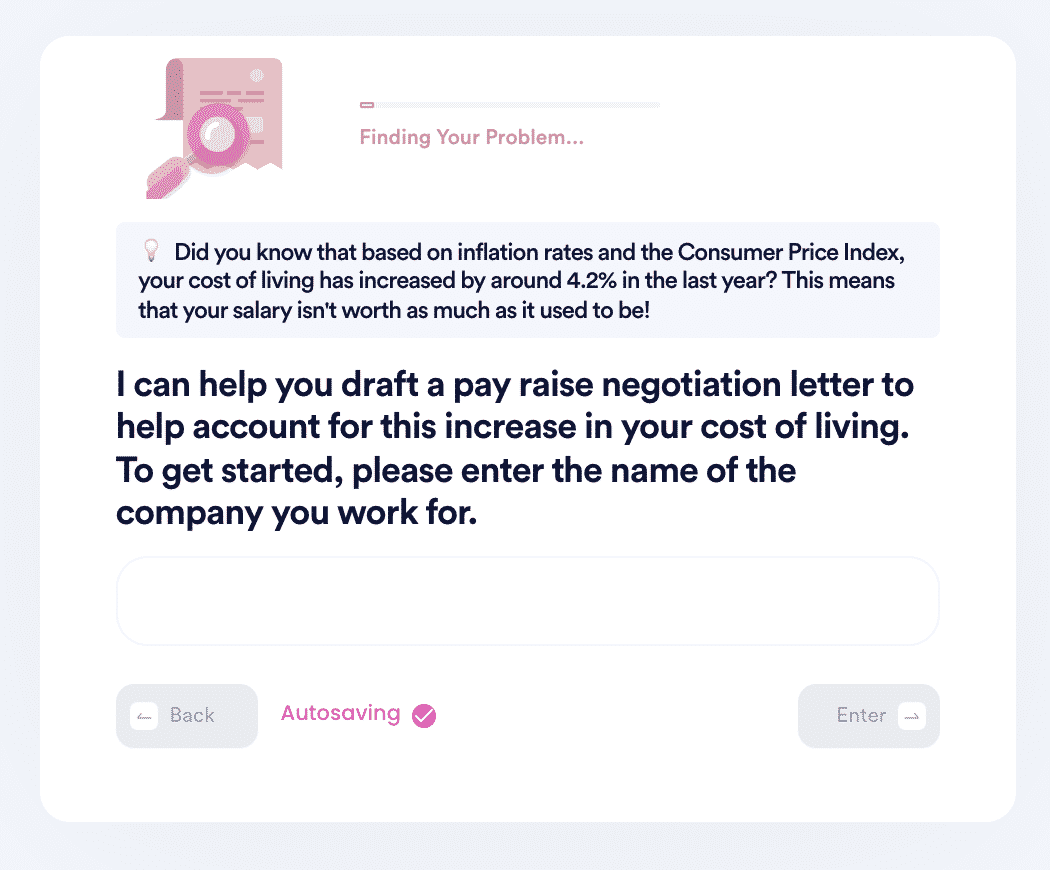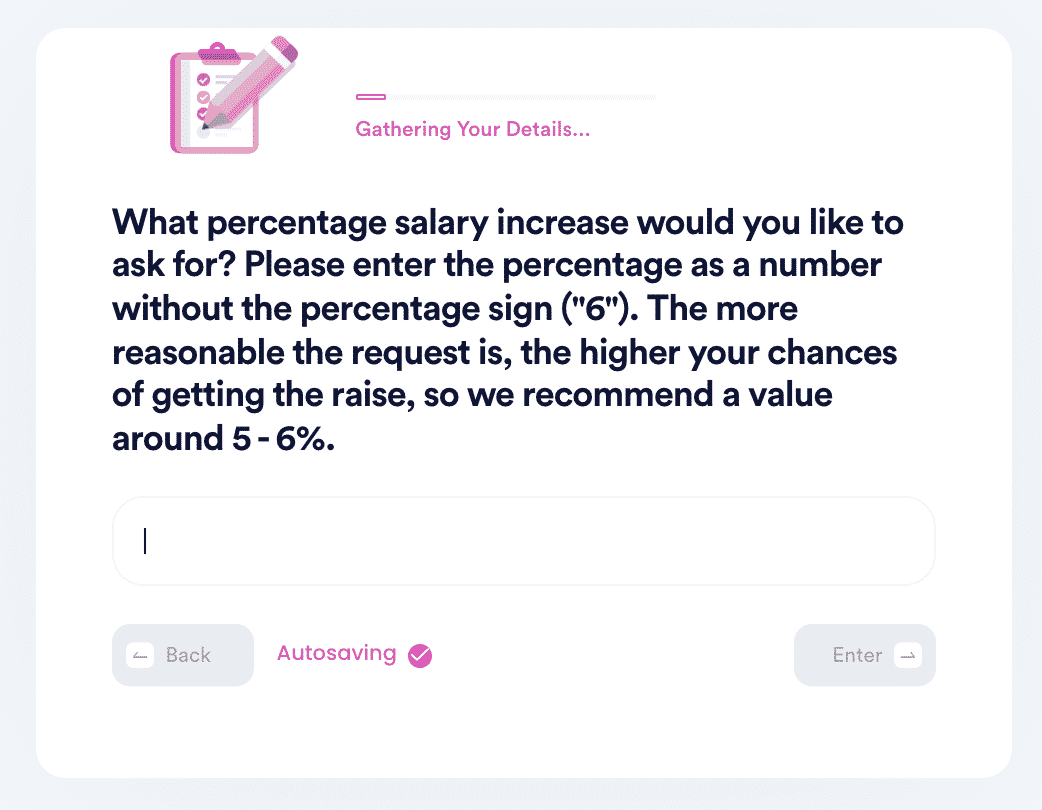How to Negotiate Salary With HR and Win
Have you been with your employer for a long time and feel like you're underpaid? Perhaps you've even talked to others in your field, and you find out you're making less than them, or you've got a job offer, but it feels like they're lowballing you. Whatever your circumstances, one of the best ways to resolve this problem is to . Here's how to negotiate salary with HR, what to expect and how DoNotPay can help make this process simpler and much easier.
5 Tips to Negotiate Your Salary Increase With HR
Before negotiating for your salary increase in person, through phone, via email, or by mail, you should do a few things to increase your chances of getting one. Your employer may feel more inclined to give you a raise if they feel you have a solid argument. Here are a few tips to help make your salary negotiation with HR successful:
-
Know Your Market Value
Employee compensation is tied to market value. Most companies pay "the going rate" for a particular position; that's why you need to ask for a realistic salary based on your skills, experience, and industry standards. Research common salaries within your area for your specific job title. This can help you determine your market value to better justify your employer paying you more.
-
Time Your Request
Timing matters when it comes to asking for a salary raise. Identify the best time in your company's cycle to have a salary negotiation. Don't ask for one when the HR manager is having a bad day, and hold off requesting an increase if the company isn't doing well. If your company has just experienced a major downsizing due to economic factors or is seeing reduced revenue, it may not be the best time to enter a salary negotiation.
-
Be Confident
It can be intimidating to ask for a raise, but confidence is key. Remember that you are an asset to your company. Your salary increase request should reflect the value you bring to the role, goals you've met or exceeded, results you have delivered, and industry averages based on your job skills and years of experience. Walk into that meeting with the confidence that you deserve your raise!
-
Have a Salary Range Rather Than a Single Figure
When negotiating your salary with your HR manager, you should always offer a range based on what others in the field are earning, rather than a single fixed number. Having an acceptable salary range helps you negotiate and reach a compromise more easily. However, ensure that the lower end of the salary range is a big ask—that way, if your HR uses it as an anchor, you'll still get a handsome bump.
-
Consider Asking For Other Benefits Instead
While there is a pretty good chance you will get the raise you ask for, there's a possibility you will not get exactly what you want. If your employers tell you that they do not have the funding to increase your salary, consider your alternatives. In place of a salary raise, you may be able to ask for other benefits. You can ask for opportunities such as working from home, flex hours, or better health benefits. Walk into the meeting with a target salary amount or other options you would accept instead of a raise.
How Often Should You Get a Raise?
Knowing how often you should get a raise can help you determine if it's the right time to ask for one. Generally, you shouldn't ask for a raise more than once a year. If you recently started a job, wait at least six months before requesting a raise, but if you have been with the company for more than a year, you can ask for a salary increase once a year.
Reasons to Get a Raise
There are many reasons why you may feel you deserve a salary increase, such as:
- Cost of living: If you were transferred to a new branch in a city with a higher cost of living, you should ask for a raise. Pose your raise as an adjustment to compensate for higher costs.
- Company changes: If the company has acquired a large new client or had a period of steady growth, this could be a reason for a raise. You should especially mention this new growth if it has impacted your workload or you had a hand in acquiring new clients or high sales.
- Increase in responsibility: If you manage a team and the size of the team grows or take on a new project and are working more hours, you should ask for a raise. Any increase in the amount of work you are expected to do should come with a salary increase.
How to Negotiate Salary With HR on Your Own
Here are a few tips to help you negotiate your salary with the HR manager in an interview:
| Practice your pitch at least once before the actual negotiation | Running through your delivery several times can make you feel more sure of yourself heading into the salary discussion. Much of a successful negotiation boils down to feeling comfortable and practiced. |
| Be confident in your delivery | It's extremely important to put on your game face when the moment comes for negotiation. Bring confidence to the delivery of your pitch and in the negotiations that follow. |
| Build your case | Before negotiating, jot down concrete examples of how your skills and experience will benefit your new company's bottom line. |
| You don't have to accept the first offer | If you need time to evaluate an offer, say so. Schedule your next meeting for 24-48 hours after the interview and come back with your counteroffer. |
| Understand your leverage | Your negotiating power will vary depending on your current employment situation. For example, if you are unemployed and applying for work, expect to earn approximately what your old salary was or slightly less. |
| Get everything in writing | Once you and the hiring manager settle on a compensation package, ask for written documentation. |
| Be gracious | No matter the outcome, be understanding, appreciative, and thankful for the opportunity. |
Let DoNotPay Help You Negotiate Your Salary With the HR Manager
DoNotPay has tons of experience negotiating salary increases with HR managers and can help you get the raise you deserve. All you have to do is follow these simple steps:
- Search "negotiate my salary" on DoNotPay.

- Enter the name of your company and the industry you work in, so we can find the right wage statistics for your role.

- Answer a series of questions regarding your qualifications and achievements, relocation expenses, and other job offers if applicable.

- Enter the new base salary you would like to request.

And that's it! Once the information is finalized, DoNotPay will generate an official salary negotiation letter that you can then email or present to your employer!
What Else Can DoNotPay Do for You?
Helping you negotiate a salary with HR is just one of the many things DoNotPay can help with. We can also solve other problems such as:
- Fight workplace discrimination.
- Cancel any service or subscription.
- Reduce property taxes.
- Get chargebacks and refunds.
With DoNotPay handling your , there's no need to be anxious. Trust us to help you get the salary you deserve!
 By
By